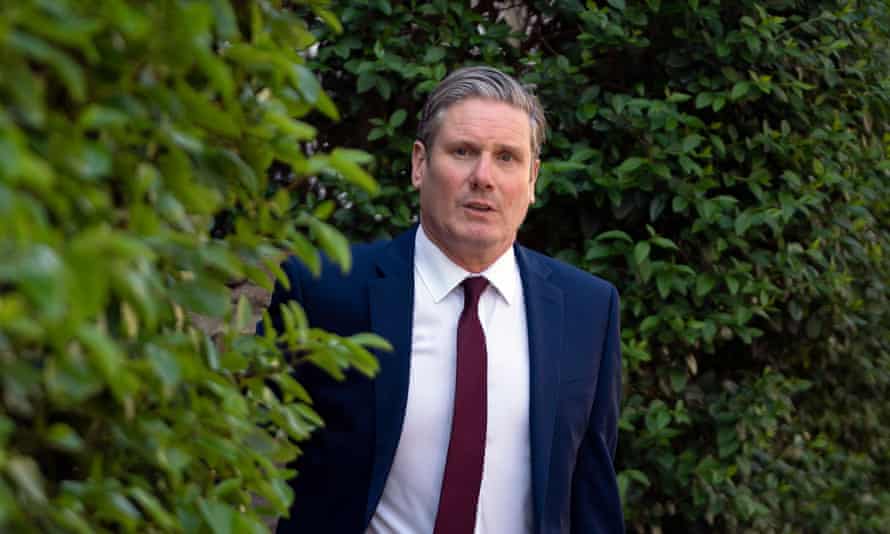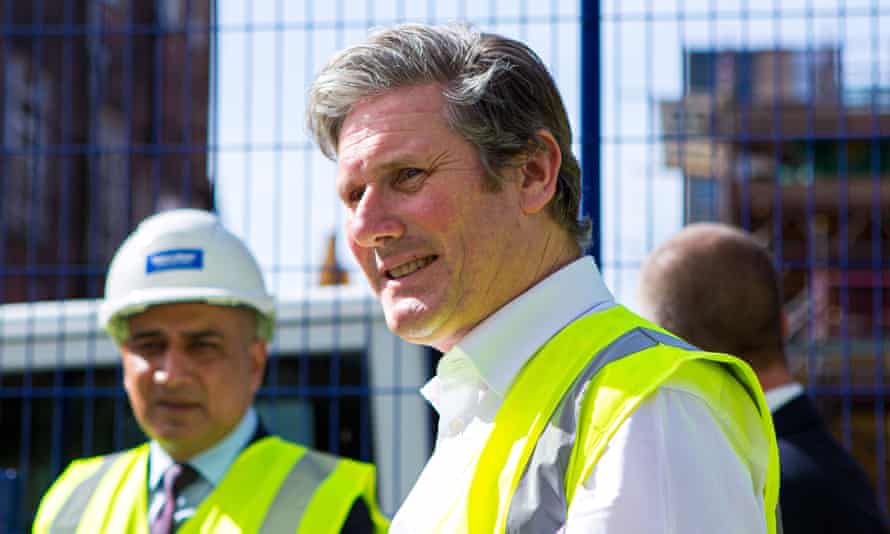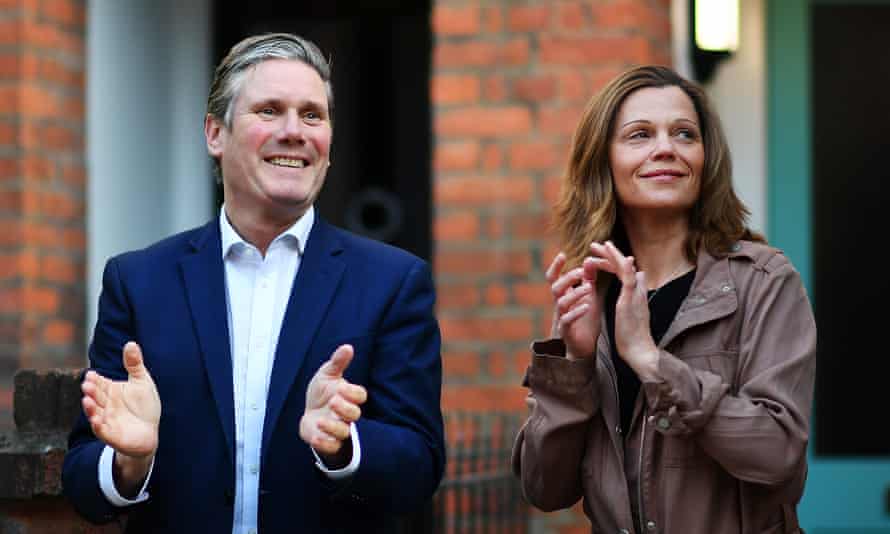Keir Starmer plans to spend the summer months criss-crossing the country to make his pitch directly to voters at scores of town hall-style meetings, in an attempt to “bring Labour home” to its traditional supporters.
A year after his election, with his personal poll ratings slipping and amid growing internal unease about his leadership, Starmer’s team say he hopes to emulate David Cameron, who fielded voters’ questions face to face on his “Cameron Direct” tour in 2008.
They also compare the plan to Emmanuel Macron’s grand débat meetings, as the French president sought to quell the discontent that drove the gilets jaunes (yellow vests) protests of 2019.
“One of the things Keir has always been most struck by is how the distance between the Labour party and the people it was created to represent has become bigger. If you want to rebuild trust, you have to bring Labour home,” said a senior aide.
As his leadership enters a new phase, after 12 months that began with an acceptance speech he had to deliver to a camera in his own home instead of a cheering crowd, Starmer will be closely scrutinised not only by the voters, but by his own party.
Taking up the leadership in a moment of profound national crisis, he made a conscious decision that Labour would act as a constructive opposition to Boris Johnson’s government.
His supporters stress that that did not mean never criticising the government – they point to Rachel Reeves’ attacks on the “crony capitalism” of personal protective equipment contracts, and to key moments when Starmer has refused to toe the government line.
In particular, they cite the Labour leader’s call for a “circuit-breaker” lockdown in October, and for tougher restrictions at Christmas, both of which were subsequently taken up by the floundering Conservative government.

But the Labour leader’s critics claim it has been a year of punches pulled, and opportunities missed.
Leftwingers, who were already wary, accuse him of lurching away from the radical policies set out in Labour’s 2019 manifesto, despite a series of pledges during his leadership campaign that stuck closely to Jeremy Corbyn’s legacy.
Andrew Scattergood, the co-chair of campaign group Momentum, cited the party’s opposition to corporation tax rises in the run-up to Rishi Sunak’s budget as an example of a shift to the right under Starmer’s leadership.
Labour’s rationale was that increasing taxes during the Covid crisis could clobber the recovery – but leftwingers saw it as a betrayal of Corbynism, and even some senior shadow cabinet members were concerned about the communication of the policy.
“I’m just extremely depressed about it all,” said Scattergood. “There seems to be an effort from the Labour party to distance themselves from everything – and that’s fine, but you can’t distance yourself without putting up an alternative.”
We have perhaps the most corrupt and authoritarian government we have had possibly ever, and they seem to be getting a free ride on everything,” he added.
Like many supporters of Starmer’s predecessor, Scattergood is also appalled by the continued suspension of the whip from Corbyn, for comments he made after the publication of the critical report of the Equalities and Human Rights Commission into Labour’s handling of antisemitism.
The Labour leader’s allies reject the idea of a shift to the centre. “We’re not in the centre on the economy: we’re on the left,” an aide said, citing Labour’s pledge to dismantle universal credit, calls by the shadow chancellor, Anneliese Dodds, for furlough to be extended last autumn, and the demand for an employment guarantee for young people, saying all of these have won support across the parliamentary party.
But if he has not shifted towards the centre on economics, Starmer has certainly made an effort to take on issues that were less dear to Corbyn’s heart.
“We’re talking about things we just weren’t on the pitch for before: Keir doing PMQs on defence, for example, crime, farming,” said a shadow cabinet loyalist. The shadow home secretary, Nick Thomas-Symonds, was this week pictured in front of a Labour poster saying, “Under the Conservatives, criminals have never had it so good.”
Phil Wilson, the former Labour MP for Sedgefield who lost his seat at the 2019 election, said: “These issues really affect people, crime, antisocial behaviour, the treatment of victims.

“Alongside that, the pandemic allows us to reassess the people who are valued workers in our society – doctors, nurses, but also delivery drivers, supermarket workers, bus drivers. What are they worth compared with people that work in the City? We need to show that we are the party for those people, that chimes with those people.”
Starmer’s supporters also point to the argument he has begun to develop on the pandemic – that 10 years of Tory neglect left the UK with “weakened foundations,” ill-equipped to withstand the deadly virus.
They hope this claim will resonate as loudly with voters as George Osborne’s jibe after the financial crisis that Labour failed to “fix the roof while the sun was shining”, although critics point out Starmer’s version is considerably less catchy.
Meanwhile, critics say Labour has been less vocal about causes that were front and centre under Corbyn, such as free movement, LGBT rights, racism and civil liberties.
In London, Sadiq Khan’s team have been quietly drawing a dividing line with Starmer’s national strategy – although the pair have been warmly supportive of each other in public.
Khan has been outspoken during his mayoral campaign about progressive values, migrant rights, LGBT and race equality – something his team regard as a vote-winner in progressive London.
Some shadow cabinet ministers feel frustrated that there is too much caution around associating Labour nationally with those values, for fear of being bogged down in a culture war with Johnson’s Tories.
Even among Starmer’s instinctive supporters, there are gnawing doubts about his leadership style. Many Labour MPs, including frontbenchers, have become increasingly frustrated at what they see as his team’s inveterate caution, and a ruthless message discipline they fear blunts the party’s effectiveness.

“My wings are properly clipped,” said one shadow cabinet minister. “And we could be out there really defending Keir. But we aren’t given the leeway. Interesting people aren’t a threat to Keir or a challenge, we can be champions for him. I don’t even think Keir sees that as a threat. He’s confident enough in himself. But he’s got a wall around him.”
Shadow cabinet ministers said Starmer keeps some distance from them, naming only Reeves and the shadow health secretary, Jon Ashworth, as those who really have his ear.
They stressed the influence of Starmer’s close aide Jenny Chapman, who they say takes many of the political decisions around party management, and his chief of staff, Morgan McSweeney.
“He trusts Jenny and Morgan implicitly. But Jenny is on the right of the party and she really only wants to reward those who supported Keir in the leadership. That is the side in the ascendency,” said one shadow cabinet minister.
“People get sat on if they attract too much attention,” complained one shadow cabinet minister. “Bridget [Phillipson] was quite vocal in shadow cabinet about concerns over our Brexit position and she hasn’t been heard of since.”
Lady Chapman lost her Darlington seat in 2019. She helped to persuade Starmer to run for the leadership, and he subsequently nominated her for a peerage. Colleagues say it is her and McSweeney who are behind Labour’s relentless focus on winning over Tory-Labour switchers in about 40 key seats such as her former constituency.
Next month’s Hartlepool byelection will be a critical early test of that strategy, alongside local elections across England. If Labour fail to hold Hartlepool, it is likely to lead to a fresh bout of soul-searching. “If things don’t go well, there will be huge pressure to shake up Keir’s inner team,” said a Labour source.
There have also been suggestions that a political big-hitter could be brought in to the leader’s office, to shape Labour’s strategy and help translate it into action.
One name mentioned by senior Labour figures is that of Peter Mandelson, who has been discussing strategy with Starmer’s team. “He could come in and get Keir to focus on the big picture, and how to present himself to the public,” said a senior Labour aide.
Rumours of a shadow cabinet reshuffle have been also rippling through Labour MPs for some time. Dodds is one of those whose post is seen by some as up for grabs – although Starmer praised the shadow chancellor this week when challenged about her future.
As party insiders continue to ask what Starmer stands for, two of his most savvy shadow cabinet ministers, Lisa Nandy and the shadow business secretary, Ed Miliband, are set to publish books in the coming months setting out their own strategic policy visions.
Nandy’s book Where Next? will look at mending the UK’s reputation abroad as well as “writing a new national story at home”. Miliband’s book Go Big is billed as containing practical schemes for tackling everything from inequality to the climate crisis.
Whether Starmer can ”go big” in the next six months remains to be seen, but his supporters insist that with the acute phase of the pandemic drawing to a close, voters will be able to see more of him up close, away from Westminster, and – they hope – will like what they see.
“If people want reassurance, I think they are going to be more than satisfied by the level of ambition that comes out of the next few months and as we move to the future,” said a shadow cabinet loyalist.
This content first appear on the guardian
